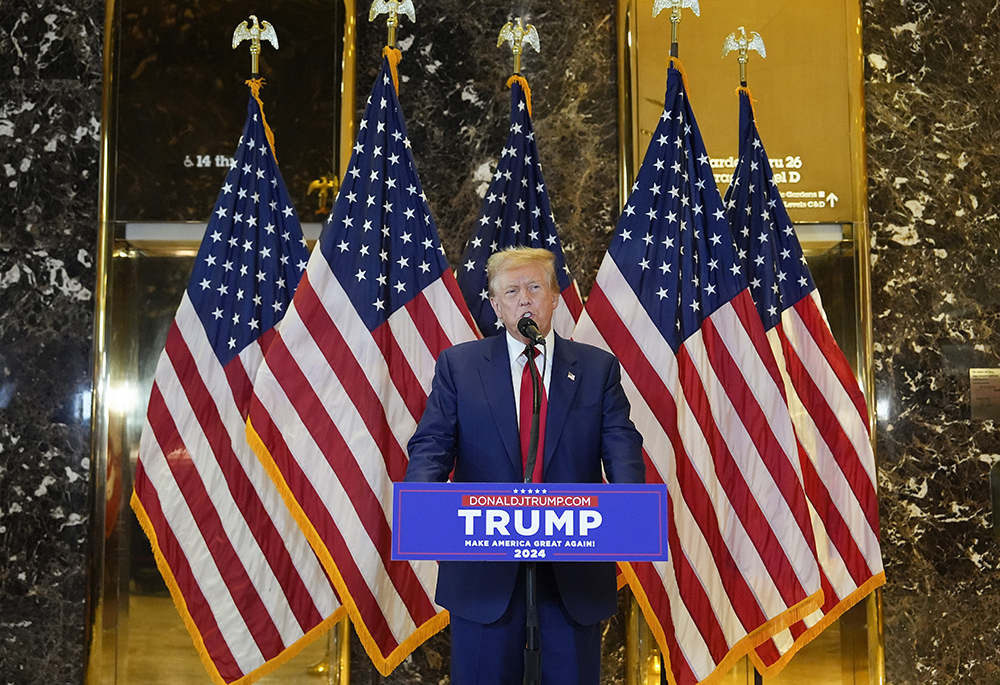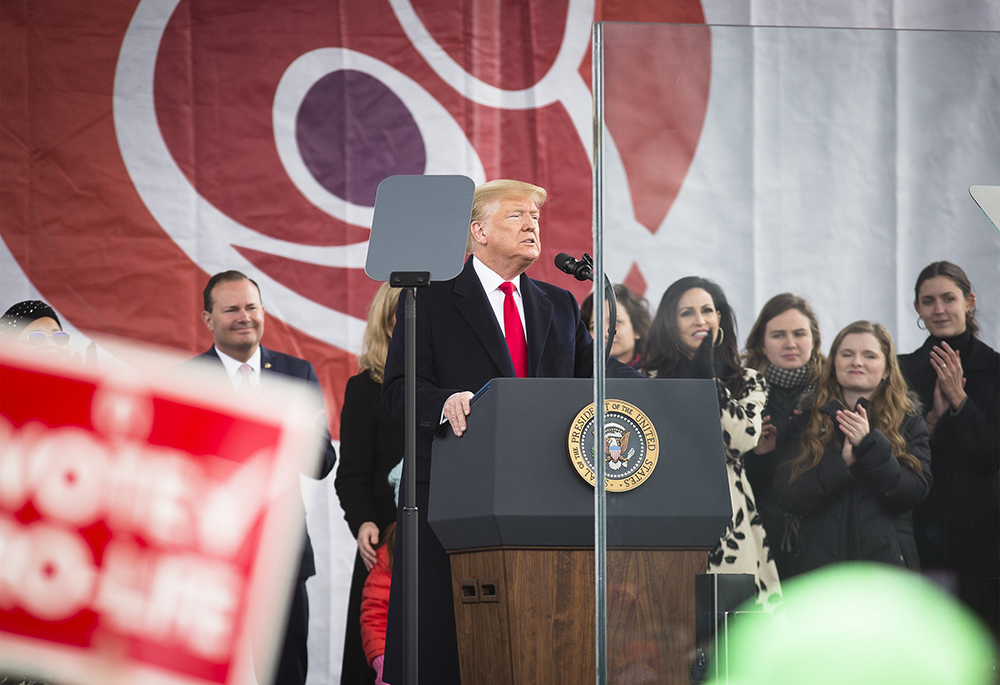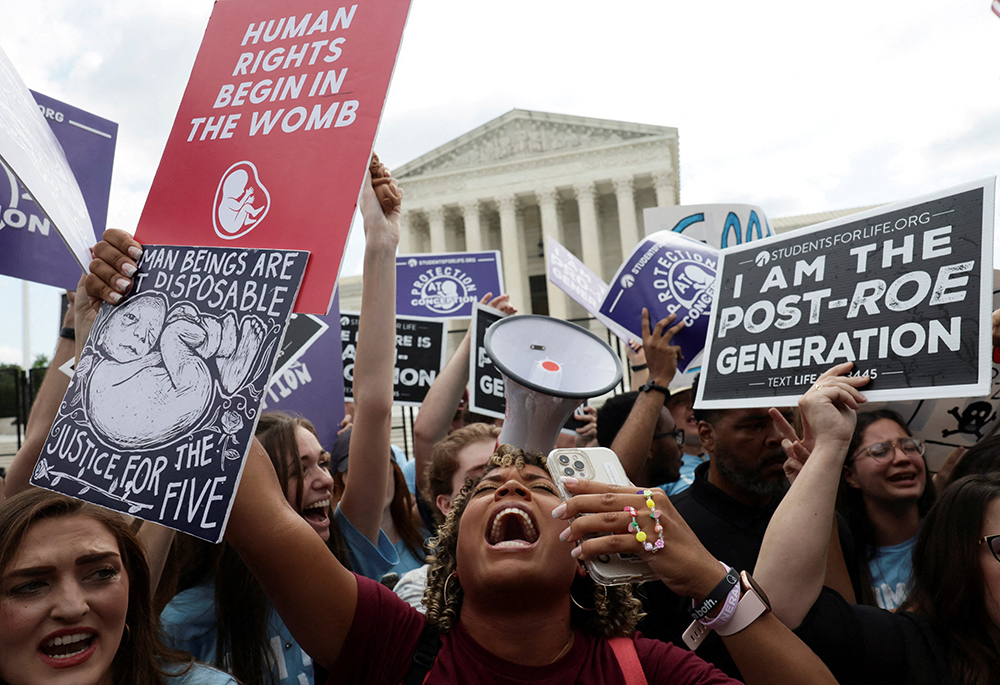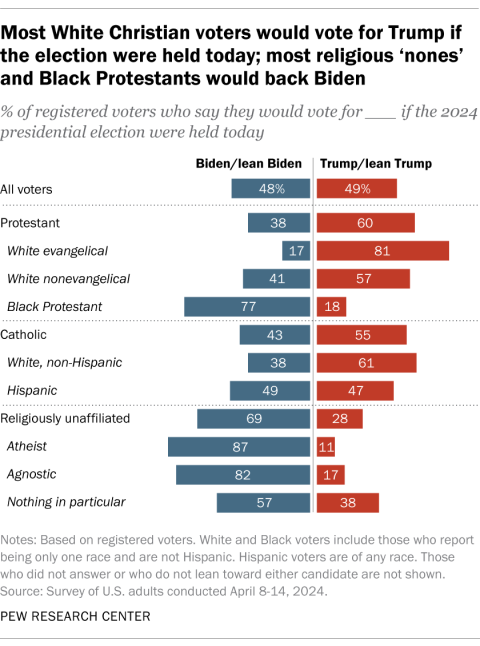
Former President Donald Trump speaks during a news conference at Trump Tower, May 31, 2024, in New York, a day after a New York jury found Trump guilty of 34 felony charges. (AP photo/Julia Nikhinson)
Robert Stenson has some reservations about Donald Trump as president, but he plans on voting for him anyway. "There's a lot of baggage with Trump, a lot of things I don't agree with," says the attorney from southern California. But Stenson believes Trump most aligns with his concerns about government overreach, both domestically and in "new wars" overseas.
Brian Rumschlag, a software architect in Indiana, says his faith guides everything in his life, including his choice for president. A self-described "card-carrying Republican," he has voted for Trump in the past and plans to vote for him in 2024. Overturning Roe v. Wade was Trump's "crowning achievement," he says. "That was a huge, huge win for the culture at large."
Abortion is also the "No. 1" issue for Keara Burke of Illinois, who supports a national ban. Although she admits that Trump has "taken a few steps backward" on the issue, she still calls him "the most pro-life president in the history of the country." But even if abortion were not on the table, she would vote for Trump, because of what she calls the "failed economic policies" of the Biden administration. She and her husband work in real estate and construction and notice that "American families are struggling," she said.
Stenson, Rumschlag and Burke — and other Catholic Trump voters who spoke to NCR — may disagree somewhat about why they support Trump. But they agree that to vote Democratic, even for a fellow Catholic like Joe Biden, would be anathema to their faith and their conservative principles. Even a third-party candidate, whose chances these voters deemed unrealistic, would be preferable to a Democrat, they said.
"It boggles my mind how anyone can call themselves a Catholic and vote Democratic," said one Trump voter, who asked that his name not be used because of his job with the New York City police department. Another said he grew up in a Republican home where to vote for a Democrat was seen as "evil."
Not even Trump's conviction on 34 felony counts of falsifying business records seems to change many Trump supporters' minds. A survey shortly after the verdict showed that more than half of voters overall approved of the jurors' decision, but that only 8% of Trump supporters want Trump to drop his White House bid.

U.S. President Joe Biden and former U.S. President and Republican presidential candidate Donald Trump are pictured in a combination photo. (OSV News photo/Reuters/Leah Millis/Amr Alfiky)
Rumschlag is not bothered by what he considers "a paperwork crime." And because so many Trump supporters see the conviction as unfair, Burke believes it may even strengthen voters' commitment to Trump.
Generations of Catholic immigrants used to be counted on as Democratic stalwarts, but for the last several presidential elections, the Catholic vote has been evenly split. As columnist E.J. Dionne Jr. famously said in 2000: "There is no 'Catholic vote.' And yet, it matters" — because at the time there was no Catholic bloc that moved predictably toward one party or the other. Catholics were the ultimate swing vote — and were concentrated in key industrial states.
An April survey from the Pew Research Center indicates a shift toward the GOP among Catholics, even among Latinos.
A majority of Catholic voters, 55%, said they preferred Trump over Biden, by a whopping 12 percentage points. Among white Catholic voters the numbers were even higher, with 61% of respondents opting for Trump, and only 38% for Biden.
While the Catholic numbers are still much lower than those of white evangelical Protestants — who preferred Trump to Biden, 81% to 17% — they indicate that Catholics have joined the right-ward trend of religious Americans.
"The myth of the white Catholic Democrat hasn't been true for 50 years," said Ryan Burge, an associate professor of political science at Eastern Illinois University and one of the country's leading data analysts on politics and religion.
"Religious people tend to be Republicans now, outside the Black church," he said. "If you're a white person and religious, you're almost Republican by default."
The most recent Pew study showed Latino Catholics narrowly favoring Biden, 49% to 47%, but previous research indicates that Latinos, too, are moving toward the GOP, according to Pew editor and writer Jens Manuel Krogstad.
"This trend toward the Republican Party has happened across demographic groups of Latinos," including gender and educational level, he said, although the shift toward the GOP is stronger among Latino men and those without college degrees.
These trends — while good news for Trump and Republicans and not-so-good for Biden and Democrats — actually signify that the Catholic vote will matter less in this election, according to political scientist Steven P. Millies.
"Catholic voters no longer are a representative sample of the United States," said Millies, professor of public theology and director of the Bernardin Center at Catholic Theological Union in Chicago.
'Catholic voters no longer are a representative sample of the United States.'
—Steven P. Millies
That's because what it means to be Catholic is shifting, Millies said, noting that disaffiliation among more progressive Catholics has reduced Catholic identity to cultural opposition to issues such as abortion, LGBTQ issues and others.
What it means to be a Republican also has changed, he said. "Republicanism is no longer a political party, it's a brand of cultural dissatisfaction. It's not about governing; it's about opposition."
As with evangelicals, political identity trumps a religious one, even as the whole religious sector of the electorate is shrinking, Millies said. And Catholics no longer represent a swing constituency.
"Whatever else the Biden era means, it's the end of political relevance of the Catholic vote," he said. "As a voice in the public square, we don't matter."
Abortion and LGBTQ issues
For the New York City police officer who supports Trump, abortion — or what he believes should be more accurately termed "baby murder" — is tantamount to a genocide and is the primary reason he supports the GOP.
"Abortion is the willful execution of one of God's children," he told NCR. "I find it surreal that people can look past that."
LGBTQ issues — especially those involving transgender people — are a close second in terms of this voter's priorities. And although he converted to Catholicism as an adult, he identifies these as essential Catholic issues — likely prompted by the U.S. Catholic bishops repeatedly identifying abortion as the church's "preeminent" priority.
"Because of our teaching on abortion and homosexuality, I think [Trump] is closer to living Catholic values than our 'Catholic' president," the New Yorker said.
For Burke, the Illinois voter, the issue of abortion is personal. When she was pregnant with her fifth child, the baby was diagnosed with Trisomy 18. The doctors suggested termination, but she chose to carry her son, Rory, to term. He lived five days.

Then-President Donald Trump speaks Jan. 24, 2020, during the annual March for Life rally in Washington. (CNS/Tyler Orsburn)
Inspired by the support they received during that time, Burke founded Rory's Way, an organization that offers support for parents facing a life-limiting diagnosis for their babies and options to carry their babies to term and care for them as long as they are able.
Burke was especially offended that Biden invited Kate Cox, the Texas woman who sought an abortion for her child with Trisomy 18, to this year's State of the Union address. Burke feels Biden misled voters about Texas' new abortion law and feels Cox was used as a "political pawn."
"Is this the compassionate America that we want to live in?" she asked.
A younger Texas voter, who asked that his name not be used, admits he somewhat automatically voted Republican in his first presidential election in 2020. But after getting involved in pro-life advocacy in college, he now intentionally is favoring Trump, mainly over the issue of abortion.
Now graduated and working in aviation, he acknowledges that others in his generation are more left-leaning, but says that fellow Catholics at his college campus ministry center celebrated when Roe v. Wade was overturned. Like him, these young Catholics don't fit in either party, he said.
For example, he says he is more progressive on gun reform and health care reform. "But they're not the important issues, as far as directly affecting the way we live."
Advertisement
LGBTQ issues also significantly influence his vote, he says. "As a Catholic, the model of the family is very important to me, and I view it as the building block of society. When the definition of marriage and family erodes away, everything starts to crumble."
Trump, whatever his limitations, including recent support for in vitro fertilization, "represents the party that is fighting against these issues," he said.
That both the Republican Party and the Catholic Church are seen as "fighting against these issues" is key for many Catholics who support Trump. In contrast, Biden seems to be leaning into his party's pro-choice base, as Democrats see abortion as a winning issue, given public opinion polls that show majority support for legal abortion.
Ironically, with Roe overturned and Trump sending muddled signals on the issue, abortion should no longer be a top issue this election, said Millies. Yet half of the Catholic Trump voters interviewed by NCR mentioned it as a top issue.
Millies believes the issue of abortion operates subtly, even subliminally, for Republican voters. "It becomes code for, 'Let's go back to the old days when everybody did what they were supposed to do,' " said Millies, who has written a book trying to reclaim Cardinal Joseph Bernardin's seamless garment approach to life issues.

Pro-life demonstrators in Washington celebrate outside the U.S. Supreme Court June 24, 2022, as the court overruled its landmark Roe v. Wade abortion precedent in its Dobbs v. Jackson Women's Health Organization ruling. The case involved a Mississippi law banning most abortions after 15 weeks. (OSV News/Reuters/Evelyn Hockstein)
Burge agrees, calling abortion "the dinner party excuse why people are Republican," because it "ends the conversation very quickly."
Burge points out that a statistically small number of American voters see abortion as murder; even among Republicans that view is the fringe, Burge said. "Most Republicans are in favor of abortion rights at some level," he said.
So if abortion is not driving most Republicans' political choices, what is? Burge says instead of faith informing politics, partisan identity has become the "master identity." Once faith and party are linked, voting for the other party becomes unthinkable.
Trump's negatives dismissed
This tight connection between identities, and the shared attitude of cultural opposition, could explain why pro-life Republicans don't abandon Trump, even as he softens his views on abortion. Adamantly pro-choice before entering politics, Trump has so far refused to support a national ban. His political strategy seems to be to take credit for appointing the Supreme Court justices who overturned Roe, but also to support a more moderate position of letting states decide abortion policy.
The young Texas voter admits it's "disappointing" to see Trump "kind of walk back" on the issue. "But between a president who has advocated for pro-life issues — maybe not to the fullest extent I would like — and President Joe Biden, who has said many, many times that he would like to codify Roe versus Wade, it's an easy choice."
The New York voter opts for Trump because "a little abortion is better than a lot of abortion." (The number of abortions in the U.S. has risen since the overturning of Roe, after a decades-long decline.)
"I personally think [Trump's] against it, but he's walking it back because unfortunately he has to play the game," said the New York voter. "Our society has become so depraved that basic morality has become an 'extremist' right position."
Other voters said they "don't know Trump's heart" on this issue, but they are willing to give him the benefit of the doubt, given his responsibility for the success of overturning Roe.
In fact, Trump gets a pass on just about any concerns that can be raised about him: his personal immorality, his moves toward authoritarianism and lack of support for democratic norms. The Trump voters who spoke to NCR dismissed these concerns as not particularly serious, or even as misinformation conspiracies. Others said they are confident the rule of law will hold.
Stenson says the narrative pushed by the mainstream media that Trump is "a singular threat to American democracy" is "laughable." Such allegations are "the last gasp of a desperate establishment that's trying to hold onto power but is worried they'll lose it."
Jan. 6, 2021, was not an insurrection, according to those who support Trump. "We've been told how MAGA Republicans are a bunch of gun-toting white supremacists," Stenson told NCR. "But it's interesting that no one showed up with any weapons, if that's what they are."
Trump's repeated claim that the Jan. 6 rioters were unarmed has been debunked, as many rioters were armed with guns, stun guns, batons, baseball bats and chemical sprays. More than 130 have been charged with using a deadly or dangerous weapon.
According to the Catholic Trump voters interviewed by NCR, nearly all politicians are immoral and corrupt, so Trump's personal morality is not an issue.
'I'm not voting for the next parish council president. I'm voting for the president of the United States.'
—Keara Burke
"I'm not voting for the next parish council president. I'm voting for the president of the United States," said Burke, explaining why Trump's personal life doesn't factor into her decision.
Others noted that Trump's marital infidelity was a problem for his soul, but his private sins don't disqualify him from public office. "He's not publicly advocating for cheating on your spouse," explained the Texas voter, contrasting that to Biden's support for abortion.
Even Trump's brash, sometimes rude, attitude is a plus for Rumschlag, the Indiana voter. "That's actually a positive," he told NCR. "I like some good old-fashioned American swagger. We lost that during the Obama years. Trump was able to bring that back."
The only issue that provided some conflict with Catholic Trump voters' faith was immigration. Those who spoke with NCR acknowledged that they agreed with Scripture's directive to "welcome the stranger" — and were aware of Pope Francis' emphasis on the issue — but emphasized the need for only "legal immigration" and accused Biden of supporting "open borders."
'I like some good old-fashioned American swagger. We lost that during the Obama years. Trump was able to bring that back.'
—Brian Rumschlag
In fact, Catholics' connection to the immigrant story — whether Europeans of past generations or Latinos of the current one — explains their move toward the GOP, says Millies.
"My reading is this is about assimilation," he said. "The immigrant path is to be more patriotic than the people already here. That's how you fit in and join the middle class. Trump is speaking that language, and so are the Republicans."
Millies says it's also why descendants of immigrants often want to slam the immigration door behind themselves. "They want to become 'real' Americans, and that means they need an outgroup," he said.
But one data point about Latino voters noted by the Pew researcher is their relatively weak party ties. In a 2022 survey, Pew found that Latinos were more likely to have a positive view of the Democratic Party, even as more Latinos were voting Republican, Krogstad said.
Even strongly partisan Latino voters hold their party identities less tightly than other groups, he said, concluding that "the future of the Latino vote remains to be seen."
And he added the standard caveat with all survey data: "How voters end up casting their ballots in the election may be different from what they say today."









